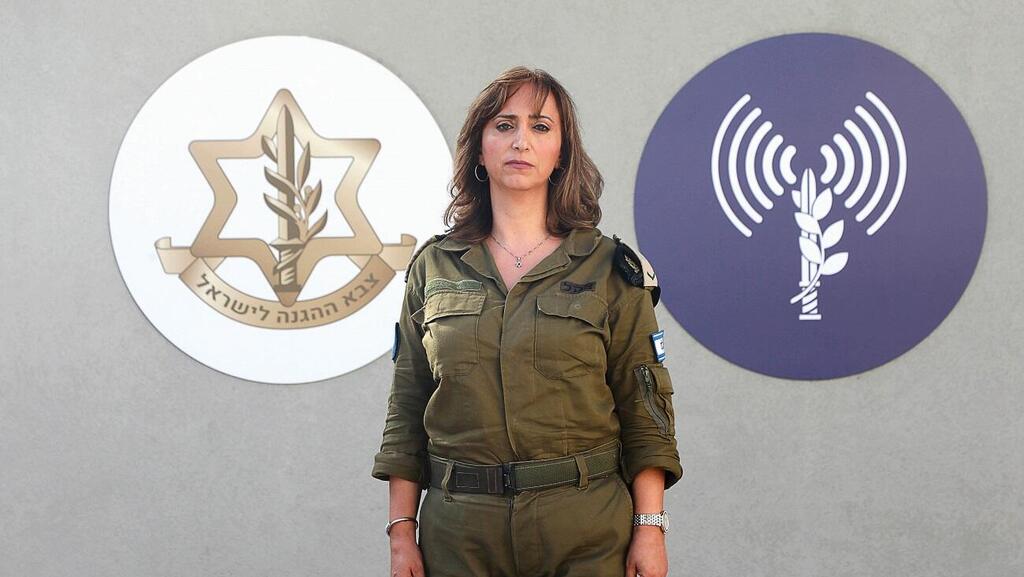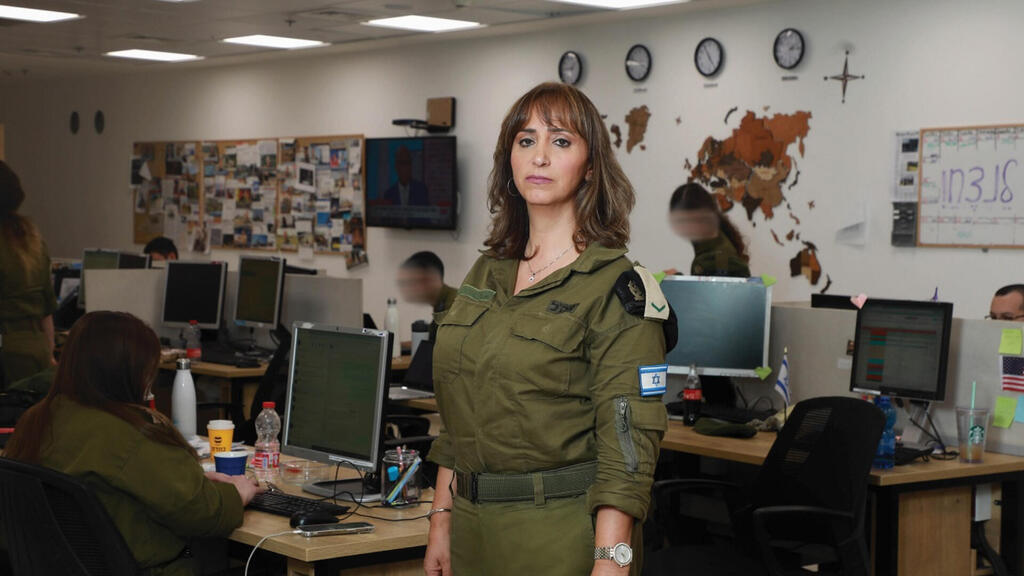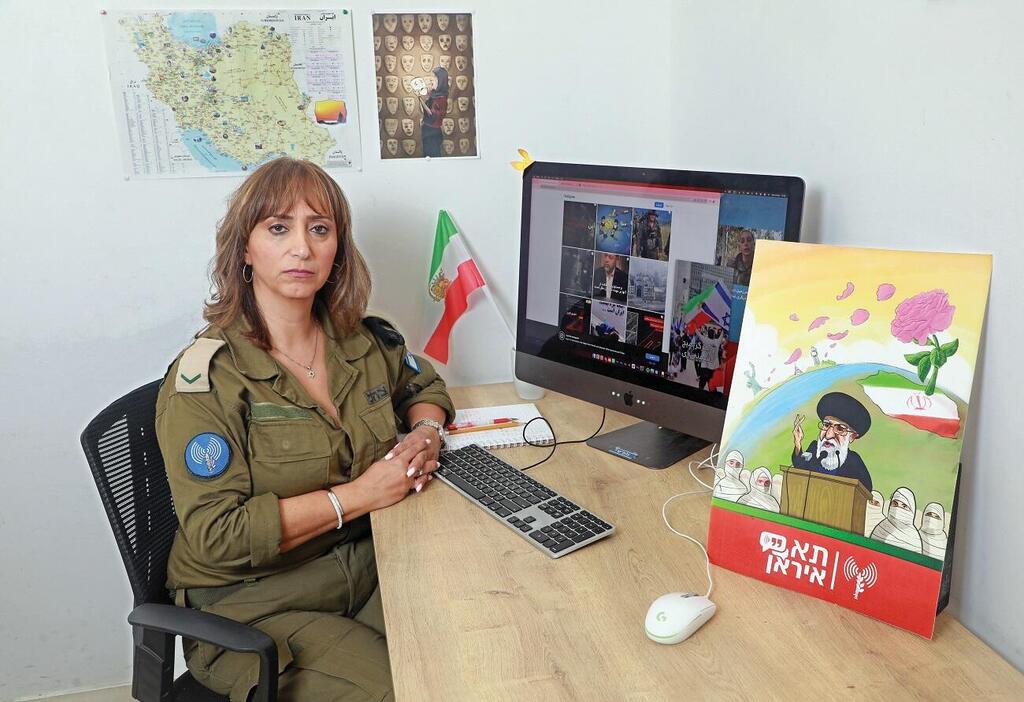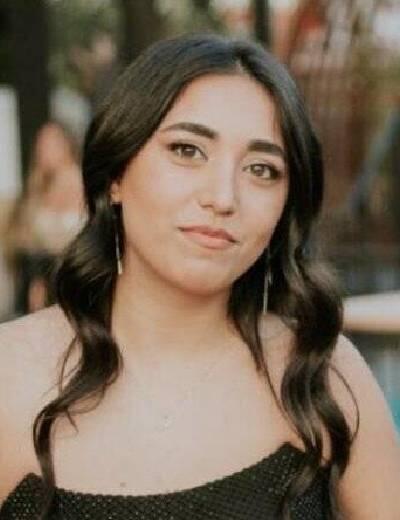On the eve of Simchat Torah, Shirly Shamsian, 49, from Rishon LeZion, who manages a branch of the Crazy Line clothing brand, was spending the holiday weekend at a Dead Sea hotel. She soon found herself in uniform with chief sergeant ranks on her lapels. 30 years after her army discharge, she was recruited to the IDF Spokesperson’s Unit to convey Hasbara to the Iranian public.
Read more:
Since her recruitment to the Hasbara system, Shamsian has filmed and broadcast seven videos aimed at the global Persian-speaking audience, that are distributed on various digital platforms. In these videos, in perfect Farsi, she explains Israel’s position and Iran’s role in the October 7th massacre. She hopes these videos will change anti-Israel popular opinion in Iran. The messages in Shirli’s videos are proscribed by the IDF. The phrase “Killing children is against the laws of Islam”, for example, accompanies hard-to-watch visuals of Hamas killing children.
Raised in Iran, Shamsian seems to know how to speak to the hearts of the Iranian public This accounts for the success of these videos. IDF data shows that 20 million users have thus far been exposed to Shamsian’s videos – 90% of whom are inside Iran.
“We’re striving to explain to them that we’re here, that we’ve existed for generations and that’s how it’ll stay,” she tells us. We tell them that Iranian taxpayers’ money funds the murder of women and children in Israel. This speaks to them because they, themselves, have been subjected to violence for over 40 years” she says.
“Our pain is the same. Last year alone, thousands of Iranians were killed in the anti-hijab protests, and for what? For how much hair sticking out? This is why they killed Mahsa Amini a year ago, and even after the demonstrations following the killing, they learned nothing. Last month, a 16-year-old girl named Armita Geravand was beaten unconscious on a train. We’re saying to them "It’s happening to you and it’s happening to us, and it’s all up to you. The Islamic Republic is taking your money to fund terror in Israel. The moment you understand and the world wakes up and understands that the real criminals are inside Iran, the world will become a better place."
"Shirel was a soldier in the IDF of Persian origin, and in the video, we feature a clip of her grandfather singing in Farsi at her grave. He bids her farewell with a wedding song, acknowledging that she will no longer be a bride. This touched the hearts of the Iranian people, as someone spoke in their language."
Do you think they’re listening? “Definitely. I see it in the responses. They appreciate the support they’re getting from the Iranian community in Israel. For three years now, they’ve seen hundreds demonstrating here supporting their cause. They’ve watched our ambassador to the U.N., Gilad Erdan stand in front of the Iranian ambassador holding a picture of Mahsa Amini. They fearlessly write to me saying “We’ve seen your support, and now it’s our turn to support you.” At a recent football match in Tehran, the crowd was asked to show support for Hamas and Gaza. Instead, they booed loudly, cursing Hamas.”
How many Jews are there in Iran?
“Estimates now number the Jewish community at 15 to 30 thousand Jews living in three major cities: Tehran, Isfahan, and Shiraz. Generally, life’s good for them. Their work is still there, but they live in fear because if you’re a Zionist in Iran, you’ll be killed – and they know it. In public, they shout “Death to Israel”, but I know that’s know how they truly feel. I see their mouths saying one thing and their eyes screaming something else completely.“
"This is how we launched ‘Radio Payam’"
Shamsian first initiated her advocacy during Operation Cast Lead in 2014 as she felt our Persian-language Hasbara was weak and insufficient. “I reached out to the Israeli Persian language internet radio station, which has sadly since closed down, asking to broadcast to the Iranian people voluntarily. I was the only person to obtain an interview with the exiled Crown Prince of Iran, Reza Pahlavi. It went well. We had a lot of Iranian listeners. When the radio station closed, I was approached by Iran Aryaee TV, owned by exiled Iranian opposition supporters in the United States, asking me to present a television program. I did an hourly show once a week for them out of my living room. I hosted Rita and Liraz Charhi who agreed to come and do some Hasbara in Persian.
Did the Iranians in Iran also see your show?
“Sure. Lots of Iranians. Although their Internet is restricted, they know how to do it. Trust them. I once received a letter from a guy who wrote ‘I was taught from an early age to hate Israel and America, but they missed one thing: We’re the Internet generation and when I’m online, I see that you’re people like us, and our hatred has no reason.’ He’s now one of Israel’s biggest supporters in Iran – in secret, of course. The show went off air five years ago. I then got a phone call from Menashe Amir, Kol Israel’s Iran Affairs commentator – every Iranian in Israel knows him – and he offered me a collaboration. This was when the Israeli Public Broadcasting Corporation (IPBC) was set up and they closed Kol Israel in Persian. He said to me ‘I’ve been watching your show. What can you offer us?’ I said to him, ‘Let’s start a radio station.’ This is how we launched ‘Radio Payam’ where we broadcast and do Hasbara.“
How did you get to the IDF Spokesperson’s Office?
“I was watching the horrors on television. We’ve just been through nothing less than another Holocaust and I felt that I had to do something. I called a friend I’d kept in touch with from my army service days and said ‘I need to get into uniform and sign up for reserve duty. I don’t know how, but make it happen.’ He called whoever he had to, and the very same day the IDF Spokesperson’s Office called me and just said ‘Come.’ I showed up with ideas ready. It’s nice to see the videos going up on other platforms too, such media channels of the exiled Iranian opposition. From there, they resonate across the globe.“
“In one of our most popular videos, I compare what the Iranian people is going through to what we went through on that terrible Saturday. In the video, I say ‘They silenced you, they tortured you, they murdered you, they hanged you, and now it’s reached us. And who’s responsible for all of this? Who taught Hamas to carry out these atrocities?’ In the end, I say that we have a common enemy and a common pain. This message speaks to them.“
Would you like Iran’s rulers to see your videos?
“No. They don’t interest me. I don’t think I’ll ever convince them. I’d like the mother sitting in her living room in Iran to watch and listen to me. If she identifies with us, we’ve won.”
In one of your most successful videos, you tell the story of Shirel Hayim, a female operations sergeant who fell on October 7th. Why did you choose her?
"Shirel was an IDF soldier of Persian descent. Iranian Opposition in Exile’s website, ‘Iran International’, had run a story on her that had raised great interest in Iran. Our video shows her grandfather singing in Farsi at her gravesite. It’s a Persian folksong that’s usually sung at festive occasions, mainly weddings. Her grandfather chose to say goodbye to her with a wedding song, as she’ll never be a bride. This was very moving for Iranians because they were watching someone speaking in their language, singing the wedding song they know, at the grave of a young woman who’ll never get married.“
"I refused to curse Israel"
Shamsian was born in Tehran, the eldest of three. When she was almost 14, a decade after the revolution that turned Iran from a pro-western country, into a totalitarian Islamic republic, the family came to live in Israel. She remembers little of the revolution besides the riots on the streets and then not leaving the house for a week. “I remember my father in front of the television. He was very sad and I realized something had happened” she tells us. “Until then, my childhood had been very happy and free. I was raised in a Jewish home. We celebrated all the holidays. We had freedom of religion and a good life. Everything became more difficult after the revolution. We suddenly had to wear head coverings. When I was about six, I remember walking in Tehran’s central square and my head covering fell out of place. Soldiers noticing this, arrested us all and took us in for interrogation. They only let us go the following day in exchange for a bribe.”
Most of the Jews left Iran after the revolution. Why did you stay?
“My father was a wealthy man, with assets and property. My mother lived like a queen. We lived in a palace with servants and chauffeurs. They couldn’t have imagined it would get so bad. And you couldn’t take anything out of the country. It all happened overnight. The day after the revolution, we had to wear hijabs for school – even though I was at a Jewish school. Then the Jewish principal was replaced with an extremist Muslim who informed us that we would now also have school on Shabbat. I was 13. We had to line up every morning. They would inspect our hijabs, make sure we weren’t wearing any make-up, and that we didn’t have any Western books in our bags. In these line-ups, we had to curse the Great Satan, America, and the Little Satan, Israel. It was compulsory in all schools in Iran.
"I refused to curse Israel, so I had an idea. Instead of saying in Persian ‘Mark Israel’ (Death to Israel), I changed one letter and said ‘Bark Israel’, changing the meaning to ‘Arise, Israel.’ I shared this with other pupils, and for two weeks we said ‘Bark Israel.’ Then, the teacher noticed what was going on and asked who was responsible for this and they all pointed at me. She sent me to the principal who shouted at me about how I was raising sedition and that my sentence would be death. She gave me the chance to apologize. I wouldn’t, so she just started beating me. She slapped me, kicked me, and banged my head against a wall. It didn’t do her any good. I don’t know where my strength came from, but I refused to curse Israel.“
Why didn’t you just say the curse and have done with it?
“I don’t know. When I think about it, it makes no sense. I thought that if I cursed soldiers in Israel, something bad would happen to them. The principal called in my parents. They were very scared and tried to persuade me to curse Israel. The true heroes of this story are my parents, who understood that I just couldn’t curse Israel, and although knowing the dangers of my going against the law and the state, and that I would likely be punished, didn’t force me. At first, my mother cried and pleaded and my father said ‘Don’t ruin life for all of us’, but in the end, they realized that I was acting in keeping with the values I had learned at home. From an early age, they’d taught me that the State of Israel is holy, and I just couldn’t utter those words."
"She slapped me, kicked me, and banged my head against a wall. It didn’t do her any good. I don’t know where my strength came from, but I refused to curse Israel"
What did they do to you?
“They called the police who, to make an example of me, arrested me in front of all the children at school. I sat there alone, terrified as I was surrounded by soldiers and police.“
How were you released?
I was brought before a judge, who was a cleric. He asked my mother if she understood what her daughter had done and whether she knew what the punishment for this was. She broke down in tears. Luckily, we had fallen on a kind and merciful man who, with a little bribe, agreed to delay the trial. This gave us time to get organized and flee. After my release, my father submitted a request to leave the country for a few days to relax in Turkey, under the premise that I was emotionally distressed. He signed all his assets as security, and he stayed as the guarantee of our return. He knew he’d never see that money again. We went to Turkey that night – myself my mother, my siblings and myself. From there, with the help of the Jewish Agency, we came to Israel. My father remained in Iran for another year and then fled illegally across the Afghan border, leaving all his property behind – houses, stores, etc. If he’d have started selling his assets, they’d have gotten onto him and they’d have arrested him.“
"Half my heart is there"
Shamsian breaks down when I ask her about the transition from the palace in Tehran to the small apartment in Rishon LeZion. “My father needed to build himself up from nothing. And my mother, who had never worked outside the home, needed to go out to support us,” she sadly recalls.
You could say that fled because of you.
“I’m not proud of getting my parents into this situation. Quite the reverse. I blame myself, but I’m not sorry. This is who I am and this is what I was meant to do. They’ve reestablished themselves over the years. My father opened a store here too, and life has more or less worked out.”
"I’m not proud of getting my parents into this situation. Quite the reverse. I blame myself, but I’m not sorry. This is who I am and this is what I was meant to do. They’ve reestablished themselves over the years"
Shirley was drafted to the IDF at 18 and served in Intelligence, utilizing her Persian. She went on to marry fellow Persian, Ben Hur Shamsian. They have four children (25, 20, 19, 17). “My children understand Persian and were raised within the culture We’re proud of our long history, culture, and heritage. Did you know that Cyrus’s chief commander was a woman? It’s important to explain that Israelis and Iranians are not enemies and that we must differentiate between the people and the regime. The Iranian people are like us. They want peace and choose life. I always say that I’m like the child of divorced parents. My mother is from Iran and my father is from Israel. Half my heart is there and half my heart is here.”
Would you go back if you could?
“Not to live, but definitely to visit. Like Moroccan Jews can visit Morocco, we’d also love to visit and then come back to our own country. Because we have no other country. We’re a special people. Anywhere else in the world, when a war breaks out, people leave. Here it’s the opposite. We’re the only country in the world where when there’s a war, people come home to defend the country. Where else does this happen?”






